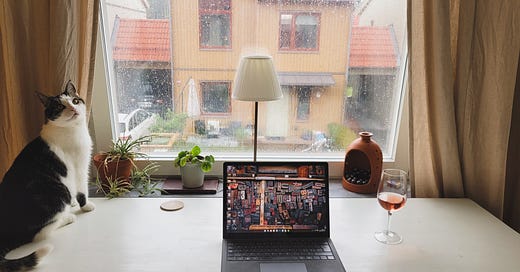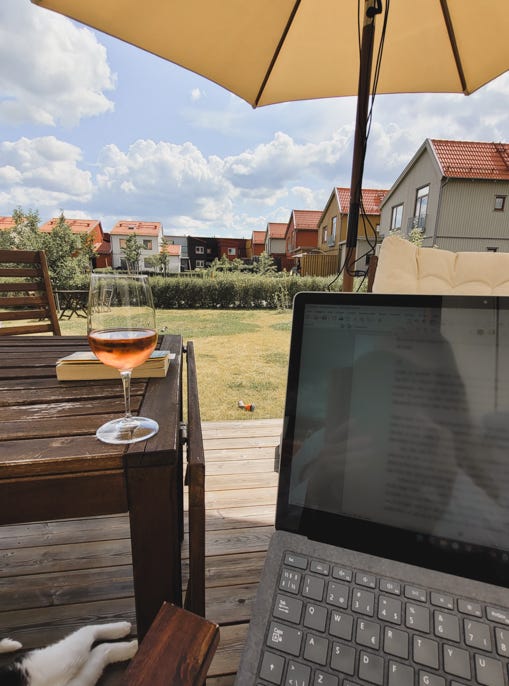One late evening at the beginning of my summer break, I moved my desk. I have loved my at home creative office, the desk, the plant hanging from a shelf above it. But in the early summer weeks, I started to long for a change.
I moved it to our guest bedroom, to a space in front of a window. And it was there, staring at the rain pouring down the glass that something unexpected happened.
I started writing something new.
The novel I was supposed to write
The best of plans were laid before the summer. I made a big deal about making working on my novel my main focus area for the summer. Never had I put the novel in the centre before. Summer was the perfect season for it. I was shifting my focus from business building. I had gotten started with the rewrite in winter and spring. I had a plan. It was time. I was ready. This was the summer I would get back into working on the novel again, finally.
I started out optimistic. An average of 500 words per day was reasonable, surely. The first week went okay. I took a few days to settle in to my summer break and then, a day with 512 words. The next, nothing. The day after that, 76 words. On the Sunday, a writing day with my friend and 1083 words.
I was writing, but it was a fight, and I wondered the same thing I had wondered over the past few months: did it use to be this hard? Was it supposed to be this hard?
Another day passed, and the day after, I decided to inject myself with some writing inspiration. I was reading Sorrow and Bliss by Meg Mason and loving it immensely, and I found a podcast interview with the author that I listened to while on a long walk.
The podcast was Write-Off. In it, Francesca Steele interviews successful authors who have failed books in their past. Turns out, Sorrow and Bliss was born out of a failed book project. Meg Mason talked about her experience writing the book that never got published:
There must have been so many days when I came out here, and I wasn’t interested in what was going to happen to my characters. So I just had to drive them through some action and push some plot onto them. I couldn’t hear their voices, so it was just like listening to myself talk.
She shared how different of an experience writing Sorrow and Bliss was. How much she cared about the characters, how excited she was to find out what was going to happen next.
I recognised myself in her experience. I remembered the thrill of the early years of writing my novel, discovering where it would take me. And now…
On that walk through the forest, it became really quite clear to me. I didn’t particularly care about my characters anymore. I paused the podcast and recorded a voice note for myself:
I feel that what once interested me with this story has now passed. And maybe I can’t reconstruct that.
At that point, I was thinking about how I could revive my characters, find my own interest in them again. But I didn’t write that day and not the next one, and two days after I had listened to the interview, I thought: maybe I should try writing something new. Just try it, to see how it feels. No expectations. Only for myself.
And so in the evening, I sat down and I wrote. And it just poured out of me.
When to move on
In her book Big Magic, Elizabeth Gilbert tells the story of a book she had to put on hold for two years.
I retrieved all my notes out of my storage and sat down at my desk in my new house, ready to recommence crafting my novel about the Amazon jungle. Right away, however, I made the most distressing discovery. My novel was gone.
(…)
I’m pretty stubborn about sticking with projects, so I prodded at the thing for several months, trying to make it work again, hoping to bring it back to life. But it was useless. Nothing was there. It was like poking a stick at a castoff snakeskin: The more I messed with it, the faster it fell apart and turned to dust.
It’s now many years since I started writing this novel of mine. It has been a practice novel, in that I have discovered a myriad of ways of writing fiction that doesn’t work. I have read books on writing techniques and tried them while writing this book. I have written with reckless abandon and had to pull everything apart and rewrite the whole thing. I have added and subtracted characters. I have been structured and unstructured, I have planned scenes in detail and written purely on intuition.
In 2020, I decided it was as good as I would get it on my own, and submitted it to publishers here in Sweden.
Since then, I have lived through a pandemic, been self-employed and gotten a job as a writer. I have had personal hopes and heartbreaks, had dreams meet reality and change into something new.
And somewhere along this way, I grew too far from where this novel began.
I have put my struggles down to being occupied by running a business, not having mindspace, and for a while, that might have been true. But I think it was masquerading a deeper root problem, that just like Elizabeth Gilbert, I have lost what I once had with my novel. It wasn’t until I cleared everything else away and still struggled to write that I realised that it might be time to move on from this project.
Writing again
It’s difficult to let go. I haven’t quite yet. I plan on rereading the latest completed draft, the one I sent to publishers, once more to see if there’s any lighter editing I can do that could make a difference. That could strengthen what is already there, rather than to change its foundation. The larger rewrite I have started on the other hand… it feels like I’m trying to write an old self’s book in my current self’s words, but who I am today wouldn’t write that story.
And actually, today’s me wants to write, but she wants to write something different.
My desk is still in front on the window in the guest room. I thought it might just be for the summer, but I don’t want to move back. I like it here. I like the new perspective.
From my years of creating seasonally, I have learned one thing about my summers: it often brings something unexpected. Sometimes it’s shifts and changes I see coming in spring, but with suspicious regularity, it’s something I haven’t anticipated or even vaguely considered. Summer of 2020, starting a Youtube channel. Summer of 2022, applying for a writing job.
And in the summer of 2023, it was starting to write a new novel.
I don’t know if it will last. I don’t know if I’ll stay interested in it. I have only written a couple of thousand words of it.
But I know this. I keep thinking of it. I keep having ideas. I wonder where it’s going to go. I feel free and light writing it. I care about the characters.
And it has been a long time since I felt that.







I could have written this myself, Elin! I have been working on a historical fiction novel since 2018 and I’m half done. I’ve tried so many times to get back into the swing of it but what once felt so inevitable now feels insurmountable. A new YA story popped into my head while writing my other novel and the pieces fell into place so quickly that I feel compelled to explore it and set my other novel aside. I think it takes so much courage to set aside a project that has taken up so much of our life but there’s so much we learn in the experience of sitting down to plot and research and write a novel that it’s never a waste.
Isn't it interesting how ideas can either grow with you or only be a stepping stone to a new idea that will take you closer to where you'd want to be? I have a world with characters that appeared in my reality/imagination back in Late Spring 2015, but the book idea I had back then versus what I want now, is completely different. For a pretty long time, I kept referring to that world through the eyes of how it appeared in my life, but with how I evolved over the years, it just doesn't fit anymore. It took me a while to accept this and to know that it's okay to let go of the initial ideas and creations. And that when you allow newness back in again, nothing is lost, nothing is wasted; it's just different and a new path you get to walk & explore. ^_^
I'm excited for you, my lovely! There's honestly nothing better than to work on something whilst being in a state where all just flows and you are really eager to see how it will evolve. I think that's the most important thing when it comes to creating in general.